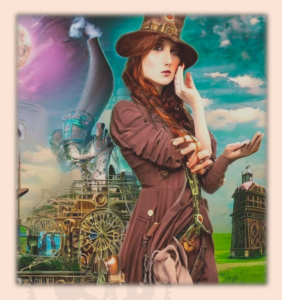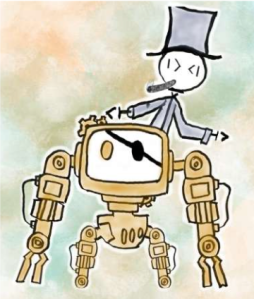During the past seven months, I’ve steamed across the Atlantic, sailed in a flying castle, teleported across the globe, and shuttled forward and backward in time. Literarily, not literally—the Quantum-Steampunk Short-Story Contest began welcoming submissions in October 2022. We challenged everybody aged 13 and over to write a steampunk narrative that involves a real or imagined quantum technology. One hundred sixty-seven entries arrived from 29 countries. Professional writers submitted stories, as did 13-year-olds. Tenured physics professors, librarians, English and math teachers, undergraduates, physicians, graduate students, and a United States Senate staffer entered. Thanks to their creativity, I now have a folder full of other worlds.
I’m over the moon (in a steam-powered ship) to announce the winners. David Wakeham received the $1,500 grand prize for the story The Creature of Ashen House. First runner-up Gerard McCaul won $1,000 for Doctor Up and Mister Down, and second runner-up Paulo Barreto won $500 for Eikonal. The People’s Choice Award ($500) went to Cristina Legarda for Pursuit, also nominated by two judges for a “Please Turn This into a Novel” award. Thanks to the 261 of you who voted in the People’s Choice competition!
In addition to traditional awards, we created four idiosyncratic ones, each entailing $250. We recognized Jeff Provine’s Stealing Buttons for its badass steampunk heroine; Matt King’s Three Imperiled Scientists for its wit and (relatedly) its portrayal of academia; Rick Searle’s The Recurrence Machine for its steampunk atmosphere; and Claudia Clarke’s Looking Forward, Looking Back, for its heart-capturing automaton. You can read all the finalist stories here.
Sending our judges the finalists in March, I felt not only exhilaration (and relief, as whittling down 167 entries entails no little hand wringing), but also anxiety. Would the stories measure up? So I must have glowed when the first judge submitted his evaluations: Speculative-fiction author Ken Liu enthused, “The entries were so fun to read.” Similar reactions followed from across the panel, which featured experts in mathematics, philosophy, creative writing, experimental quantum physics, and history: “I had a very good time reading these stories,” another panelist wrote. “This was fun and some excellent spring break airplane (no dirigibles, I’m afraid) reading,” said another. Many thanks to our judges and short-listing committee for their input. University of Maryland undergraduates Hannah Cho and Jade Leschack led the team of students who narrowed down the candidates. I couldn’t resist treating the committee to a Victorian-inspired thank-you upon announcing the winners.
Although this year’s contest has ended, quantum-steampunk literature has just shipped out from its berth. Two contest entrants have posted their stories on their own online domains: You can read the mystery by Duke physics professor Ken Brown here and the adventure by quantum-algorithm designer Brian Siegelwax here. All other entrants, please feel free to post your stories and to submit them to other literary contests. Drop me a line, and leave a link in the chat below, when your story is published. I’d love to hear how your journey continues.
Also, stay tuned for v2.0 of the Quantum-Steampunk Short-Story Contest. An organization has expressed interest in a reboot during the 2024–2025 academic year. AI-collaboration category, anyone? Bonus points if you use a quantum neural network. Please email me if you’d like to support the effort!
The opportunity to helm this contest has been a privilege and a dream. Many thanks to our writers, readers, funder (the John Templeton Foundation), staff (especially webmaster Anıl Zenginoğlu), judges, and shortlisting committee. Keep writing, and keep experimenting.



Comments